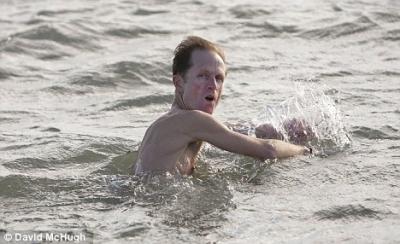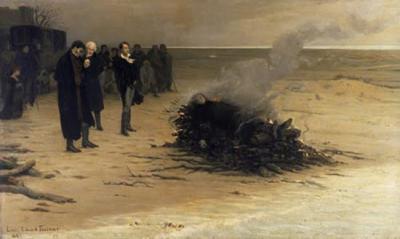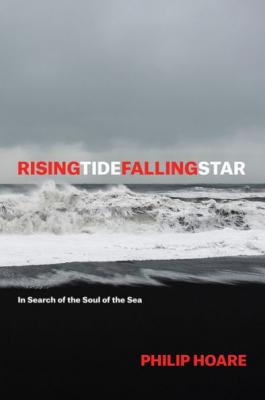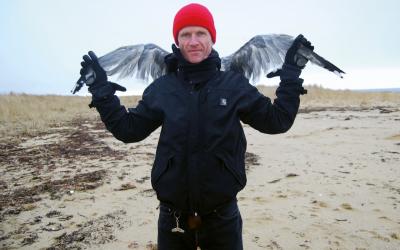In the opening pages of RISINGTIDEFALLINGSTAR, Philip Hoare says that the writing of this book was triggered by his discovery of a copy of a 1968 Penguin edition of The Tempest, with an evocative woodcut cover by David Gentleman depicting a galleon lurching on high seas. It’s hard to believe he needs a prompt to kick start his oceanic writings which also include Leviathan, or the Whale (2008), The Whale: In Search of the Giants of the Sea (2010) and The Sea Inside (2013). This is a person who chose @philipwhale for his Twitter handle. On the other hand, Hoare seems susceptible to suggestion, especially if it is draped in seaweed. Let’s believe that The Tempest tempted him into the surf.
 He claims to swim every day of the year in a tidal estuary near Southampton, England or while revisiting a beach on Cape Cod. When landlocked, he is distressed. In the new book, he says that “every day is an anxiety in my ways of getting to the water. I worry that something will stop me from reaching it, or that one day it won’t be there – as it is, and it isn’t, twice a day. I’ve become so attuned to it, so scared of it, so in love with it that sometimes I think I can only think by †he sea … It is the only place where I feel free and alive, yet I am shackled to it and it could easily take my life one day, should it choose to do so … And even if the sea has become a carbon sink, absorbing the energy we have released from the sun, this cistern of our sins is still the repository of our dreams.”
He claims to swim every day of the year in a tidal estuary near Southampton, England or while revisiting a beach on Cape Cod. When landlocked, he is distressed. In the new book, he says that “every day is an anxiety in my ways of getting to the water. I worry that something will stop me from reaching it, or that one day it won’t be there – as it is, and it isn’t, twice a day. I’ve become so attuned to it, so scared of it, so in love with it that sometimes I think I can only think by †he sea … It is the only place where I feel free and alive, yet I am shackled to it and it could easily take my life one day, should it choose to do so … And even if the sea has become a carbon sink, absorbing the energy we have released from the sun, this cistern of our sins is still the repository of our dreams.”
RISINGTIDEFALLING STAR is not so much about the sea as about what Hoare’s mind does when he thinks about or encounters the sea. The narrative churns according to a tidal schedule, first following Hoare through a beach’s wrack line to the water, then returning with stories about other water- and sea-obsessives, a cast including Byron, Shelley, Thoreau, Melville, Elizabeth Browning, Virginia Woolf, Wilfred Owen, Stephen Tennant and Sylvia Plath. But once we wade into the telling, Hoare’s shrewd disorderliness takes over, an impulse to swirl and toss everything together. Repetition and rhythm vie with fate and terror. The sea’s grandeur and tyranny, its extremes, may be perceived as individual traits but the final effect is one of shivering awe. This is passionate writing about and for the drowning.
 A Professional Fellow in English at the University of Southampton, Hoare relates these literary lives and their works through the places he has seen and the waters he has entered. In his brisk telling, Shelley’s makeshift funeral pyre on the sands at Viareggio or Woolf’s plunge into the River Ouse gain fresh nuances through his view of the author’s works. He wants us to know that Woolf read Moby-Dick in 1919, in 1922, and once more in 1928. “This sea is as freighted as any in Moby-Dick or The Tempest, and it suffuses Woolf’s most intensely felt work,” he writes. “The Waves is flooded with a stream of consciousness, invoking the voices Virginia heard in her head on the days and nights when her condition drive her to talk unintelligibly for hours on end, and when she lay confined to her bed in her house by the river at Richmond, ‘mad & seeing the sunlight quivering like gold water, on the wall, listening to the voices of the dead.’”
A Professional Fellow in English at the University of Southampton, Hoare relates these literary lives and their works through the places he has seen and the waters he has entered. In his brisk telling, Shelley’s makeshift funeral pyre on the sands at Viareggio or Woolf’s plunge into the River Ouse gain fresh nuances through his view of the author’s works. He wants us to know that Woolf read Moby-Dick in 1919, in 1922, and once more in 1928. “This sea is as freighted as any in Moby-Dick or The Tempest, and it suffuses Woolf’s most intensely felt work,” he writes. “The Waves is flooded with a stream of consciousness, invoking the voices Virginia heard in her head on the days and nights when her condition drive her to talk unintelligibly for hours on end, and when she lay confined to her bed in her house by the river at Richmond, ‘mad & seeing the sunlight quivering like gold water, on the wall, listening to the voices of the dead.’”
In his world, it is not merely a coincidence that Sylvia Plath was taught at Smith College by Newton Arvin, Melville’s biographer. As newly-weds, Plath and Ted Hughes came to Cape Cod and Sylvia’s favorite beach at Nauset. Hoare writes, “Here they found the oldness of a new world that Hughes had imagined before he’d ever seen it, defined by the ocean and ‘the whaled monstered sea-bottom’ … While her husband thought of the men who drowned out there, ‘Where darkness on Time / Begets pearl, monster and anemone,’ Sylvia was reading Woolf again. She finished The Waves, disturbed by its ‘endless sun, waves, birds, and strange unevenness.’ She felt Woolf’s writing made hers possible.” Hoare wants us to glimpse Sylvia on that particular beach, peering at the fiddler crabs that scuttled there and fretting over her productivity.
 For the English, to affect the world required a departure from harbor, even if only to the wilds of Ireland. To go to war meant to cross the Channel and often to die on the ocean. The death of Admiral Nelson in 1805 fascinated Melville who saw “a sort of priestly motive” in Nelson’s ornament-laden battle coat as if he “adorned himself for the altar and sacrifice,” an inspiration for Ahab. Melville visited Greenwich in 1849 to see the Nelsoniana for himself. Seventy years later while writing To The Lighthouse, Woolf visited as well and was moved to tears. Hoare’s prose carries the vibration of these connections without affectation or pushy epiphanies. His book is filled with chilly recognitions.
For the English, to affect the world required a departure from harbor, even if only to the wilds of Ireland. To go to war meant to cross the Channel and often to die on the ocean. The death of Admiral Nelson in 1805 fascinated Melville who saw “a sort of priestly motive” in Nelson’s ornament-laden battle coat as if he “adorned himself for the altar and sacrifice,” an inspiration for Ahab. Melville visited Greenwich in 1849 to see the Nelsoniana for himself. Seventy years later while writing To The Lighthouse, Woolf visited as well and was moved to tears. Hoare’s prose carries the vibration of these connections without affectation or pushy epiphanies. His book is filled with chilly recognitions.
In Hoare’s hands, Wilfred Owen’s promising youth and enlistment for trench warfare occur with the sea in the background. “Rupert Brooke’s sonnet saw the fighting as an antidote to ennui: ‘To turn, as swimmers into cleanness leaping, / Glad from a world grown old and cold and weary,’” he writes. “To Wilfred, a stark choice presented itself. ‘I have made soundings in deep waters,’ he told his mother, ‘and I have looked out from many observation-towers: and I found the deep waters terrible, and nearly lost my breath there.’ He took the headlong dive.”
 Hoare’s recent experiences at the seashore are rendered as moments of attention. With perfect timing, he pivots between the present and various past times – all combining into the illusion of a single moment of compulsive, briny imagination, the long legacy of The Tempest. He writes, “Constantly recreated, constantly re-enacted, The Tempest lived on beyond its creator, passed on from hand to hand. It became a secret cipher, a futuristic shipping forecast, an extended magical spell. It conjured a queer sea out of its strange beasts and its masquerades, and stood against time and tide even as it rose with them in a storm stirred up by a dramatist whose own identity still seems fluid and uncertain … Haunted and haunting, The Tempest accompanied the twentieth century as a parallel rite.”
Hoare’s recent experiences at the seashore are rendered as moments of attention. With perfect timing, he pivots between the present and various past times – all combining into the illusion of a single moment of compulsive, briny imagination, the long legacy of The Tempest. He writes, “Constantly recreated, constantly re-enacted, The Tempest lived on beyond its creator, passed on from hand to hand. It became a secret cipher, a futuristic shipping forecast, an extended magical spell. It conjured a queer sea out of its strange beasts and its masquerades, and stood against time and tide even as it rose with them in a storm stirred up by a dramatist whose own identity still seems fluid and uncertain … Haunted and haunting, The Tempest accompanied the twentieth century as a parallel rite.”
The custodial task of Hoare’s writers has been the preservation and maintenance of a magical spell. “I’ll drown my book,” says Prospero when it is time to relinquish his own magic. Each in his and her own way, the writers drowned. Billy Budd, left unpublished at Melville’s death, is an artifact left on the beach when something like the sea swept away its author. “I hate to be near the sea,” wrote William Hazlitt in Characteristics in 1823, “and to hear it raging and roaring like a wild beast in its den. It puts me in mind of the everlasting efforts of the human mind, struggling to be free and ending just where it began.” Hoare hears these same sounds and fears his next swim could be his last. But he craves the nearness of the sea.
[Published by the University of Chicago Press on April 20, 2018. 394 pages, 72 black & white photos/images, plus chapter illustrations by Joe Lyward. $20.00 paperback]